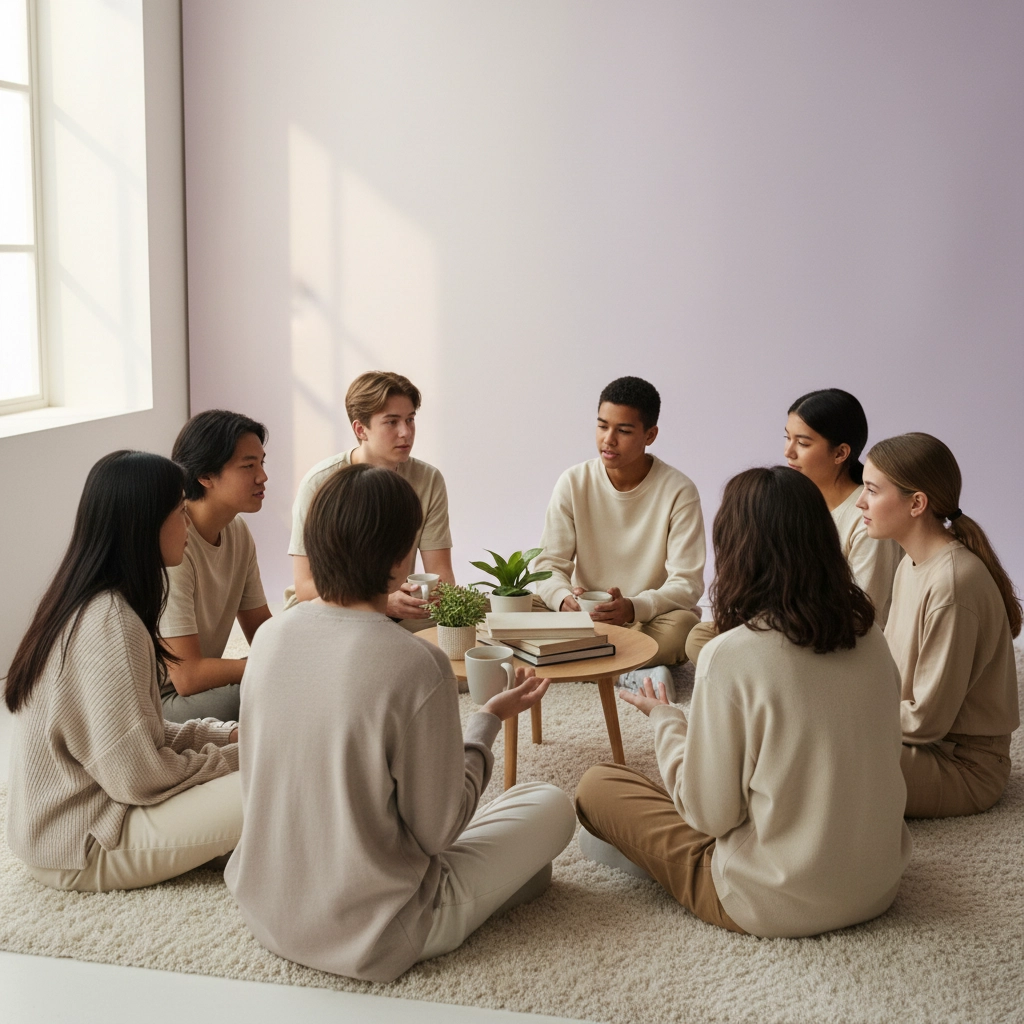Illinois Mental Health Education Law: 7 Things Every Chicagoland Parent Should Know About House Bill 2960
- clairestew
- Oct 14, 2025
- 4 min read
As parents in Chicagoland, we're witnessing unprecedented conversations about youth mental health in our schools and communities. While we navigate these important discussions, Illinois House Bill 2960 represents a groundbreaking student-led effort to bring comprehensive mental health education directly into our children's classrooms. Here's what every parent needs to know about this pending legislation and how it could impact your family's educational experience.
1. This Bill Came Directly from Students Who Understand the Need
House Bill 2960 isn't another top-down educational mandate: it emerged from the lived experiences of two remarkable high school juniors, Abhinav Anne and Sai Ganbote, both students at the Illinois Mathematics and Science Academy. These young advocates witnessed firsthand how their peers struggled with mental health challenges, particularly following the COVID-19 pandemic.

Their initiative demonstrates something powerful: when we listen to young voices, they often lead us toward solutions that truly address their needs. These students understood that their generation faces unique pressures around academic performance, college applications, and social expectations that previous generations didn't experience in quite the same way.
2. The Bill Is Still Moving Through the Legislative Process
Currently, HB 2960 remains in the House Rules Committee, where it was re-referred in April 2025. This means the bill hasn't become law yet, but it continues to have active support from six Democratic sponsors, including lead co-sponsor Representative Laura Faver Dias.
For Chicagoland families, this pending status means we're in a crucial period where community voices and advocacy can still shape how this legislation moves forward. The bill represents hope for systemic change, but it also requires continued community support to become reality.
3. It Would Integrate Mental Health into Existing Health Classes
Rather than creating entirely new courses, HB 2960 would require school districts to weave comprehensive mental health instruction into their existing health education curriculum for middle and high school students. This approach recognizes that mental health isn't separate from physical health: they're interconnected aspects of overall wellness.
The integration model makes sense both educationally and practically. Students would learn about mental health alongside other health topics, normalizing these conversations and making them part of regular educational experiences rather than special, potentially stigmatizing programs.

4. Student Privacy Remains Protected and Respected
One of the most important aspects of HB 2960 addresses parent concerns about privacy. The bill explicitly states that students cannot be required to disclose confidential health or mental health information during instruction. This protection ensures that learning about mental health doesn't become a pathway to forced disclosure or uncomfortable personal sharing.
This privacy provision reflects thoughtful consideration of how mental health education can be informative and supportive without being invasive. Students learn about concepts, coping strategies, and resources without pressure to share personal struggles publicly.
5. It's Different from the Mental Health Screening Law Already in Effect
Many parents confuse HB 2960 with Senate Bill 1560, which Governor Pritzker signed into law in July 2025. Understanding the difference helps clarify what each piece of legislation actually does for our children:
HB 2960 (pending): Focuses on mental health education integrated into health classes
SB 1560 (already law): Establishes universal mental health screenings beginning in the 2027-28 school year for grades 3-12
The screening law functions similarly to vision and hearing tests, providing assessments at no cost to schools while allowing parents to opt their children out. The education bill, meanwhile, would teach all students about mental health concepts and resources as part of their regular curriculum.
6. The Curriculum Would Address Diverse Student Needs
HB 2960 takes an intentionally equitable approach to mental health education, with particular attention to communities that face unique challenges. The legislation specifically mentions focusing on diverse groups, including LGBTQ+ students, Asian Americans, and other communities that may experience distinct mental health pressures.
This inclusive framework recognizes that mental health challenges don't affect all students in the same ways. Cultural stigma, family expectations, identity development, and community support systems all influence how young people experience and address mental health concerns.

The proposed curriculum would cover essential topics including:
Stress-coping mechanisms and resilience building
Education about anxiety disorders and their management
Recognition of warning signs in yourself and others
Available resources and when to seek help
Understanding mental health as part of overall wellness
7. Parents Can Take Action Right Now
While HB 2960 continues through the legislative process, parents have several ways to engage with this important issue:
Stay Informed: Follow the bill's progress through the Illinois General Assembly website and connect with local parent groups discussing youth mental health initiatives.
Contact Representatives: Reach out to your state legislators to share your perspective on mental health education in schools. Whether you support or have concerns about the bill, your voice matters in shaping its future.
Submit Witness Slips: Parents can formally express their stance on HB 2960 by submitting witness slips, providing direct input to lawmakers considering the legislation.
Support Current Mental Health Resources: While we wait for potential legislative changes, families can access existing mental health resources and support systems. Our comprehensive guide to navigating Illinois youth mental health services provides practical starting points.
Join Community Conversations: Participate in school board meetings, parent-teacher organization discussions, and community forums where mental health education gets discussed. Your involvement helps ensure any future programs truly serve our children's needs.
Moving Forward Together
House Bill 2960 represents more than just another educational requirement: it reflects our community's commitment to supporting young people's complete well-being. Whether this specific legislation becomes law or evolves into something different, the conversation it sparked demonstrates that Chicagoland families, educators, and students recognize mental health education as essential, not optional.
The fact that high school students initiated this effort reminds us that young people often understand their needs better than we might assume. By listening to their voices and supporting comprehensive approaches to mental health education, we create environments where all students can thrive academically, socially, and emotionally.
As we continue following HB 2960's journey through the legislative process, we invite you to stay engaged with these important discussions. The future of mental health education in our schools depends on active community participation and thoughtful dialogue about how we can best support our young people's mental wellness.
For questions about youth mental health resources or to discuss how MHAGC can support your family, contact us. Together, we're building stronger, more supportive communities for all our children.

Comments